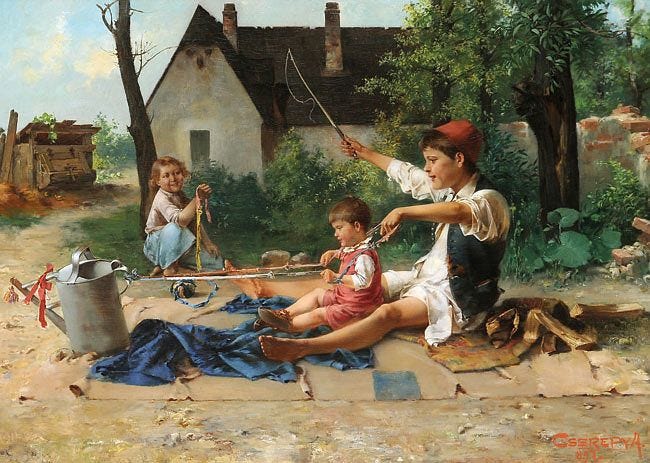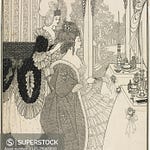Our Poem of the Week is about childhood and being whole and sound. “It’s one of my favorites in the world!” I might cry out if I were still a child. Well, it is — and the best part of me remembers those days with love and gratitude.
When I was a little boy, I didn’t look forward to the time when I’d be grown up. Why should I? I was learning on my own, reading, so I didn’t have to wait for age and the teachers to get around to me. I had dozens of cousins — 39, to be precise, and 20 of them lived in my town. I played ball, I roamed the woods with my dog at all seasons, I listened over the radio to my beloved Saint Louis Cardinals, and of course there was the church, right across the street from our school, and after Mass on Sunday we always went to my grandparents’ house for the afternoon and for supper, which was always macaroni and meatballs, immense plates of it, with the best sauce in the world, cooked in a big cast-iron pot. That was my father’s side of the family. My other grandparents lived a stone’s throw from our house, and I saw them constantly. “Go pick me a couple of good tomatoes from Nonno’s garden,” my mother would say, and that was a treat, but I never needed a reason to go there. None of us did. We’d just show up, as if it were our house too, as would my aunts and uncles and cousins. Sometimes in the evening the old folks would be playing pinochle — “Pinochle Pete,” my grandfather was called; or they’d be watching Gunsmoke on television. “Don’t you trust that guy, Matt!” I can hear Nana saying, because she and he were still like children. There wasn’t a drop of ill will in either one. If only I were like them now! If only I had remained a child.
Our poet this week, George Herbert, was an Anglican priest, and that meant of course that he baptized little infants, as did the Presbyterians in Scotland, but the question was certainly in the air — why do that? We don’t muddle about in controversies here at Word and Song, as it’s not the place for it, but Herbert does give us two answers. First, God graciously “antedates” in Baptism the faith that will become explicit once the child reaches the age of reason. Second, and the more fascinating of the two, is that childhood itself is the aim, even the softness and suppleness of being a baby. Herbert has Jesus’ words in mind: “Suffer the little children to come unto me, and hinder them not, for of such is the kingdom of Heaven.” He’s also thinking of the narrow way and gate: grownups piled high with all the goods and the worries of the world will be too bulky to get through, but a little boy such as I was could just whistle his way in.
The very form of the poem’s stanzas suggests the way we have to go. There are five lines, symmetrically arranged, in a 2-4-5-4-2 pattern, the numbers for the “feet” in each line. We begin as little ones, and then we grow big and old, but all the true work of healing the soul is in becoming little and childlike again. The flesh can get on “by stealth” — and that’s a sly pun, because stealth is what those who steal practice. But, says Herbert, let the soul bid nothing in the card game of the world. “The growth of flesh is but a blister,” says he, in a most daring line, a line of remarkable power and insight. But that’s just the lead-up to the final line, so simple, so mysterious, and so true: “Childhood is health.”
(One tip before you hear or read the poem: the word “behither” is a rare preposition, meaning “on the hither side of,” “on this side of,” the opposite of beyond. “Behither ill” means that you’re here, close by, and sin is still a distance away.)
Since, Lord, to thee
A narrow way and little gate
Is all the passage, on my infancy
Thou didst lay hold, and antedate
My faith in me.
O let me still
Write thee great God, and me a child:
Let me be soft and supple to thy will,
Small to my self, to others mild,
Behither ill.
Although by stealth
My flesh get on, yet let her sister
My soul bid nothing, but preserve her wealth:
The growth of flesh is but a blister;
Childhood is health.













Share this post